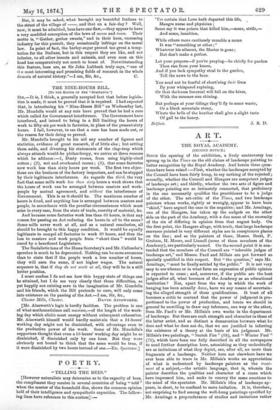THE NINE-HOURS BILL.
[TO THE EDITOR OF THE "SPECTATOR:1
SIR,—It is, I think, a generally accepted fact that before legisla- tion is made, it must be proved that it is required. I had expected that, in introducing his "Nine-Hours Bill" on Wednesday last, Mr. Mundella would at any rate have proved that he had a case which called for Government interference. The Government have interfered, and intend to bring in a Bill limiting the hours of work to fifty-six per week in factories, in place of the present sixty hours. I fail, however, to see that a case has been made out, or the reason for their doing 60 proved.
Mr. Mundella brought to his aid any number of figures and statistics, evidence of great research, if of little else ; but setting them aside, and divesting his statements of the clap-trap which always attends would-be philanthropy, we arrive at three reasons which he adduces :-1, Dusty rooms, from using highly-sized cotton ; (2), wet and overheated rooms ; (3), that some factories now work less than sixty hours per week. The first two objec- tions are the business of the factory inspectors, and can be stopped by their legitimate interference. As regards the third, the very fact that some mills work less than sixty hours a week ttbows that the hours of work can be arranged between masters and work- people by mutual agreement, and without the interference of Government. This is as it should be. The maximum number of hours is fixed, and anything less is arranged between masters and people, in accordance with the peculiar circumstances which must arise in every case, from the state of trade, scarcity of material, &c.
And because some factories work leas than 60 hours, is that any reason for passing an Act reducing the hours in all to the same? Some mills never work at all, and as a natural conclusion, all should be brought to this happy condition. It would be equally legitimate to compel all factories to work 60 hours, and thus the loss to masters and work people from "short time" would be cured by a beneficent Legislature.
The Socialistic tone of the Home Secretary's and Mr. Callender's speeches is much to be deprecated. Nothing can be more erroneous than to state that if the people work a less number of hours, they will earn the same, if not higher wages. The natural sequence is, that if they do not work at all, they will be in a still better position.
I must confess I do not see bow this happy state of things can be attained, but I do see very clearly that those difficulties, as yet happily not existing save in the imagination of Mr. Mundella and his friends, which the Bill pretends to cure, will only come into existence on the passing of the Act.—I am, Sir, &c.,
[Mr. Ainsworth's logic is hardly faultless. The problem is one of what mathematicians call maxima,—of the length of the work- ing day which elicits most energy without subsequent exhaustion. Mr. Ainsworth himself would hardly maint am n that a 24-hours' working day might not be diminished, with advantage even to the productive power of the work. Some of Mr. Mundella's supporters thought that even a 10-hours' working day might be so diminished, if diminished only by one hour. But they were obviously not bound to think that the same would be true, if it were diminished by two hours instead of one.—En. Spectator.]


































 Previous page
Previous page